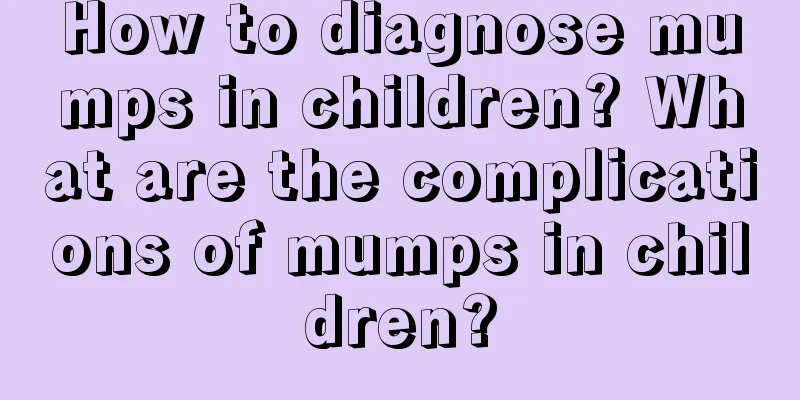How to diagnose mumps in children? What are the complications of mumps in children?

|
Children generally have weaker immunity, and are easily infected during the high-incidence season of viruses. Mumps is a respiratory infectious disease, and its main symptom is swelling of the parotid glands. There is a vaccine for it, and parents of children with weak immunity can take them for vaccination. How to diagnose mumps in children1 Urinalysis is one of the four routine tests. When mumps is more serious, it may affect the patient's kidneys. At this time, a routine urine test can reveal protein, red blood cells and white blood cells. 2 Serological examination Serological examination is the most accurate method for diagnosing mumps. Among them, the neutralizing antibody test is commonly used. If the low degree is lower than 1:2, it can be directly diagnosed as mumps. There are other serological tests including complement fixation test and hemagglutination inhibition test, which can also diagnose mumps, but it is related to the time of the examination, and multiple examinations may be required. 3 Peripheral blood count Because mumps is an inflammatory disease, the white blood cell count in the body will increase, so the patient's peripheral blood count will show an increase in white blood cell count, and at the same time, the number of lymphocytes will also be higher. If mumps is accompanied by other diseases, the number of white blood cells will be even higher. 4 Urinary amylase determination Mumps patients have a special indicator, that is, the urine amylase content in the body will increase to varying degrees, and the degree of increase is proportional to the severity of mumps. The more severe the symptoms, the more the urine amylase increases. What are the complications of mumps in children?1. Deafness When children have mumps, deafness can also be a complication. When you find that your child has hearing problems, please seek medical attention as soon as possible. If treatment is not timely, the child is very likely to become lifelong deaf. 2. Nephritis: When a child has mumps, toxins will appear in his urine, which can be harmful to the child's kidneys. Some patients will show a small amount of protein in their urine, but some serious patients will have the same symptoms as nephritis, and particularly serious patients will die. 3 Pancreatitis When children have mumps, it is easy to cause complications, namely pancreatitis, which can cause stomach pain, abdominal distension, nausea, fever and other symptoms. Sometimes it is very likely to be misdiagnosed as gastroenteritis by doctors. So when such symptoms are found, you must go to the hospital for blood and urine tests. 4 Meningitis and encephalitis Meningitis and encephalitis are particularly common complications. This symptom is more likely to occur in boys than in girls. Symptoms such as headache and nausea usually occur. Meningitis and encephalitis usually occur at the same time as patients have mumps, so it is recommended that you go to the hospital for examination as soon as possible. If it is serious, it may cause death. Will mumps heal on its own?There is a certain degree of self-healing. If it is viral mumps, there is a certain degree of self-healing. However, if the virus cannot be controlled, it may cause the condition to worsen further. You need to go to the hospital for treatment and use antiviral drugs in time. Generally, the medication can significantly relieve the symptoms within one week. So if you have this disease, don't wait. Going to the hospital for treatment in time is the most correct choice. What should children pay attention to in their diet for mumps1. Don’t eat spicy food: Children with mumps should stay away from spicy and irritating foods, such as peppers, hot sauce, chili oil, garlic, fennel, mustard, five-spice powder, cinnamon, etc. These foods are spicy and hot, increase fire, and produce phlegm and dampness, which are very unfavorable for the treatment of the disease. 2. Avoid raw and cold food: Children with mumps usually have fever, so it is not suitable to eat raw and cold food, such as ice cream, cold drinks, etc., to avoid indigestion, even diarrhea, and aggravating fever. 3. Do not eat dry and hard food: Children with mumps will have swollen parotid glands and lymph nodes, and pain when opening their mouths. Chewing dry and hard food will cause more severe pain and is not conducive to recovery from the disease. Peanuts, walnuts, apples, biscuits, corn, pork bones, lean meat, fried foods, etc. are not suitable for children. 4 Do not eat vegetables rich in fiber: Foods such as celery, bamboo shoots, winter bamboo shoots, leeks, garlic sprouts, bean sprouts, spinach, and beans require hard chewing, so patients should eat less. 5. Avoid overly sweet, salty, and sour foods: Children with mumps should eat a light diet. Overly sweet and salty foods will stimulate the parotid glands and make the disease worse. Acidic foods such as vinegar, sweet and sour spareribs, and plum soup will increase saliva secretion and increase the burden on the parotid glands. |
Recommend
Should heterosexual parents kiss their children on the mouth?
In life, we often see parents and children expres...
What is the appropriate air conditioning temperature for a baby's room in summer? How much should I set the air conditioning for a newborn?
Summer is here, and the baby's room will be v...
Is it good for children to take calcium tablets? Can it help them grow taller?
Calcium is an important component of human bones ...
What to do if a pregnant woman has inverted nipples?
There are many things that pregnant mothers need ...
How long does it usually take for a child to catch a cold and have a fever? Can children with a cold and fever eat eggs?
Many parents know that children's health is v...
How to promote your baby's intellectual development and physical coordination
If babies find sounds interesting, dance with joy...
What are the benefits of children playing games? How should parents limit it?
Children love to play video games. Basically, pla...
What are the games that children can play to develop their intelligence? How to develop children's intelligence
What are the games that children can play to deve...
When is the best time for children to take calcium supplements? How should children take calcium tablets?
Parents hope that their children are as tall as p...
Will pregnant women gain weight due to edema? How long will it take for pregnant women to recover from edema?
Many mothers will experience edema in the late st...
Can pregnant women eat ugly oranges? Can pregnant women eat ugly oranges?
Ugly orange is a special variety of orange. Altho...
Can washing your face with toothpaste remove spots and whiten your skin? Does washing your face with toothpaste hurt your skin?
We all know that toothpaste is used for brushing ...
What are the symptoms of anemia in children? What are the dangers of anemia in children?
Children not eating well must be a problem that w...
Which has a higher success rate, frozen embryo or fresh embryo? What are the advantages and disadvantages of frozen embryo and fresh embryo transplantation?
We have all heard of frozen embryos. Many female ...
Can pregnant women eat green dates? Taboos on eating green dates
Green dates are a very common fruit. They contain...









